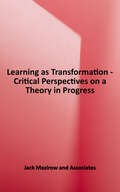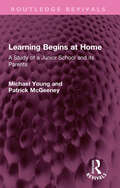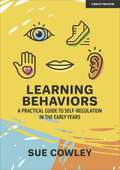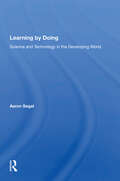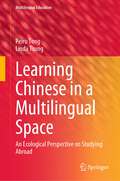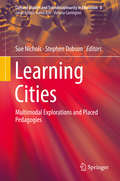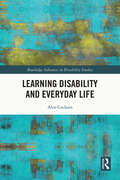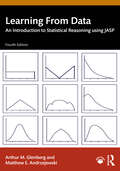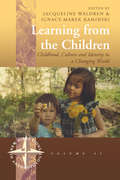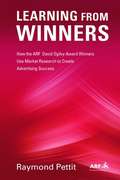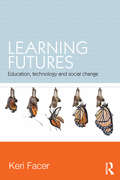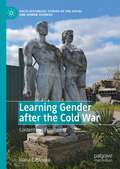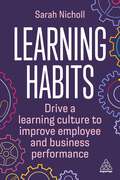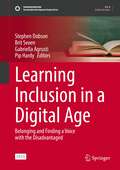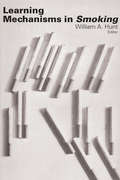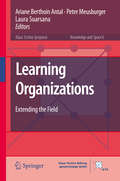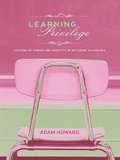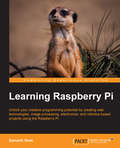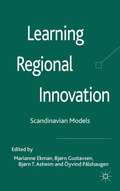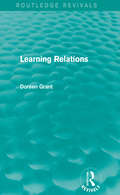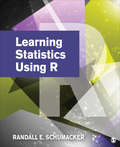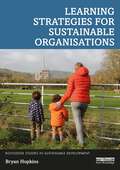- Table View
- List View
Learning As Transformation: Critical Perspectives on a Theory in Progress, 1st Edition
by Jack MezirowProvocative and illuminating, this book is a must-read for adult educators seeking to understand and facilitate transformational learning. It showcases a stellar group of authors who not only engage each other and the reader in constructive discourse, but who also model the heart of the transformational learning process." --Sharan B. Merriam, Department of Adult Education, University of Georgia This volume continues the landmark work begun by Jack Mezirow over twenty years ago--revealing the impact of transformative learning on the theory and practice of adult education. Top scholars and practitioners review the core principles of transformation theory, analyze the process of transformative learning, describe different types of learning and learners, suggest key conditions for socially responsible learning, explore group and organizational learning, and present revelations from the latest research. They also share real-world examples drawn from their own experiences and assess the evolution of transformative learning in practice and philosophy. Learning as Transformation presents an intimate portrait of a powerful learning concept and invites educators, researchers, and scholars to consider the implications of transformative learning in their professional work.
Learning Begins at Home: A Study of a Junior School and its Parents (Routledge Revivals)
by Michael Young Patrick McGeeneyFirst published in 1968, Learning Begins at Home records an attempt by two researchers to initiate and assess an innovation in a school in a working-class neighbourhood. The influence of parents upon children’s achievement is a platitude of education. The vital question is whether schools can become centres for education for adults as well as children, influencing the parents directly, and the children indirectly through the parents. The research reported in this book suggests that it would be worthwhile for teachers to give more of their time to cooperation with parents. This book will be of interest to students of education and sociology.
Learning Behaviours: A Practical Guide to Self-Regulation in the Early Years
by Sue CowleyIn this book, Sue Cowley looks at the way that behaviour develops during the earliest years of a child's life, exploring how babies and young children learn behaviours and move from co-regulation to self-regulation. She gives practical advice about how to support children in learning all aspects of positive behaviour while they are in your early years setting. She explores the different behaviours that children need to learn and develop in order to be happy and successful learners in their future school careers and beyond. From learning how to share, to learning how to pay attention; from learning how to be responsible, to learning how to be kind. This book covers all these learning behaviours and much, much more.Learning Behaviours is a book full of practical strategies, realistic suggestions and down to earth advice. Sue offers a step by step guide to getting behaviour right, and a range of case studies to help you understand how the approaches work in practice. Sue Cowley is a qualified early years teacher, the author of over 30 books for teachers and an internationally renowned teacher trainer. She has helped to run her local early years setting for the last ten years.
Learning Behaviours: A Practical Guide to Self-Regulation in the Early Years
by Sue CowleyBest-selling author and qualified early years teacher Sue Cowley looks at the way that behavior develops during the earliest years of a child’s life, exploring how babies and young children learn behaviors and move from co-regulation to self-regulation. Learning Behaviors gives practical advice about how to support children in learning all aspects of positive behavior while they are in your daycare, preschool or kindergarten. Sue explores the different behaviors that children need to learn and develop in order to be happy and successful learners in their future school careers and beyond. From learning how to share to learning how to pay attention; from learning how to be responsible to learning how to be kind – this book covers all these learning behaviors and much more.This is a book full of practical strategies, realistic suggestions and down-to-earth advice. Sue offers a step-by-step guide to getting behavior right, and a range of case studies to help you understand how the approaches work in practice.
Learning By Doing: Science And Technology In The Developing World
by Aaron SegalScience and technology capabilities are crucial to the economic growth of developing countries and to their ability to compete in the world economy. What factors enable some countries to successfully adapt technology to create indigenous capabilities and what factors cause others to fail? In this first global survey of science and technology capabilities in developing countries, the authors examine the experiences of Africa, the Caribbean, Latin America, the Middle East, China, India, and East Asia. Specialists in science and technology policies in these regions emphasize learning by doing: using available science and technology in its various applications--the shop floor, universities, and research institutes--to eventually develop indigenous capabilities. The authors consider why such capabilities have emerged in some societies but not in others and discuss their importance for domestic and international relations. Also considered are the implications of the "learning by doing" process for international relations, international trade, regional studies, science and technology policy, and management studies. This unique survey will interest a large audience, from technology policymakers and regional specialists to business managers, and officials. It will serve as a reference guide to the current state of science and technology policies in every region of the world and as a framework for analyzing and understanding how science and technology capabilities are being developed.
Learning Chinese in a Multilingual Space: An Ecological Perspective on Studying Abroad (Multilingual Education #41)
by Linda Tsung Peiru TongThis book examines the benefits of an Australian in-country study (ICS) in China programme and explores ways to maximise the short-term ICS experience in a multilingual space. The book employs an ecological perspective which has seldom been used to examine the study abroad context. It emphasises the importance of the space itself as an arena of interaction, belonging and power, where conduct and modes of communication are often regulated by political authorities and societal expectations. Specifically, the book focuses on the following: • the extent to which the ICS facilitated interaction in different settings • the way in which interaction during ICS contributed to language learning • the degree in which the interaction during ICS contributed to culture learning and • the role of identity in the learning process in the ICS. The main argument of the book is that while the ICS promoted multilingual learning space for in-class and out-of-class interactions, which further facilitated language and culture learning to a great extent, Australian students’ identities and self-concepts also played a core mediating role throughout individual learning trajectories.
Learning Cities: Multimodal Explorations And Placed Pedagogies (Cultural Studies and Transdisciplinarity in Education #8)
by Stephen Dobson Sue NicholsThis book is an interdisciplinary text exploring the learning and educative potentials of cities and their spaces, including urban and suburban contexts, at all stages of life. Drawing on the insights of researchers from diverse fields, such as education, architecture, history, visual sociology, applied linguistics and sensory studies, this collection of papers develops and demonstrates the connection between experience, in all its dimensions, and informal learning in the city. The chapters discuss various sensory domains of experience, considering visual, embodied, and even sexual dimensions in relation to what and how learning operates, and the contributors reflect on their learning and inquiring experiences in the city, with special reference to topics such as narrativity, ‘race’ and ethnicity, equity, urban literacy, re-generation, participation, representation and oral histories.
Learning Disability and Everyday Life (ISSN)
by Alex CockainLearning Disability and Everyday Life brings into conversation ideas from social theory with “thick” descriptions of the everyday life of a middle-aged man with learning disabilities and autism.This book is markedly ethnographic in its orientation to the gritty graininess of everyday life—eating, drinking, walking, cooking, talking, and so on—in, with, and alongside learning disability. However, preoccupation with, the “small” coexists with a gaze intent upon capturing a bigger picture, to the extent that the things constituting everyday life are deployed as prisms through and with which to critically reflect upon the wider worlds of dis/ability and everyday life. Such attention to the small and the big—the micro and the macro—allows this book to explore the ordinary and everyday ways meanings about normalcy and abnormalcy, ability and disability, are put together, enacted, practised, made (up)—in the sense of constituting and fabricating—and, crucially, accomplished through and between people in specific, and invariably contingent, sociocultural, discursive, and material conditions of possibility.This book will be of specific interest not only to students and scholars of disability but also to persons with lived experiences of disability. This book will also be of interest to students and scholars of anthropology and sociology.
Learning From Data: An Introduction to Statistical Reasoning using JASP
by Arthur M. Glenberg Matthew E. AndrzejewskiThis fully updated fourth edition explores the foundations of statistical reasoning, focusing on how to interpret psychological data and statistical results. This edition includes three important new features. First, the book is closely integrated with the free statistical analysis program JASP. Thus, students learn how to use JASP to help with tasks such as constructing grouped frequency distributions, making violin plots, conducting inferential statistical tests, and creating confidence intervals. Second, reflecting the growing use of Bayesian analyses in the professional literature, this edition includes a chapter with an introduction to Bayesian statistics (also using JASP). Third, the revised text incorporates adjunct questions, that is, questions that challenge the student’s understanding, after each major section. Cognitive psychology has demonstrated how adjunct questions and related techniques such as self-explanation can greatly improve comprehension.Additional key features of the book include:• A user-friendly approach, with focused attention to explaining the more difficult concepts and the logic behind them. End of chapter tables summarize the hypothesis testing procedures introduced, and exercises support information recall and application.• The consistent use of a six-step procedure for all hypothesis tests that captures the logic of statistical inference.• Multiple examples of each of the major inferential statistical tests.• Boxed media reports illustrate key concepts and their relevance to real-world issues.• A focus on power, with a separate chapter, and power analysis procedures in each chapter.With comprehensive digital resources, including large data sets integrated throughout the textbook, and files for conducting analysis in JASP, this is an essential text for undergraduate or beginning graduate statistics courses in psychology, education, and other applied social and health sciences.
Learning From The Children
by Ignacy-Marek Kaminski Jacqueline WaldrenChildren and youth, regardless of their ethnic backgrounds, are experiencing lifestyle choices their parents never imagined and contributing to the transformation of ideals, traditions, education and adult-child power dynamics. As a result of the advances in technology and media as well as the effects of globalization, the transmission of social and cultural practices from parents to children is changing. Based on a number of qualitative studies, this book offers insights into the lives of children and youth in Britain, Japan, Spain, Israel/Palestine, and Pakistan. Attention is focused on the child's perspective within the social-power dynamics involved in adult-child relations, which reveals the dilemmas of policy, planning and parenting in a changing world.
Learning From Winners: How the ARF Ogilvy Award Winners Use Market Research to Create Advertising Success
by Raymond PettitThis book demonstrates how the best companies use the creative application of research, done up front, to produce the big ideas with significant impact on the market and on the people, employees, partners, retailers and customers. Readers of this book will experience how brand managers and their agencies use the right research to drive new brand in
Learning Futures: Education, Technology and Social Change
by Keri FacerIn the twenty-first century, educators around the world are being told that they need to transform education systems to adapt young people for the challenges of a global digital knowledge economy. Too rarely, however, do we ask whether this future vision is robust, achievable or even desirable, whether alternative futures might be in development, and what other possible futures might demand of education. Drawing on ten years of research into educational innovation and socio-technical change, working with educators, researchers, digital industries, students and policy-makers, this book questions taken-for-granted assumptions about the future of education. Arguing that we have been working with too narrow a vision of the future, Keri Facer makes a case for recognizing the challenges that the next two decades may bring, including: the emergence of new relationships between humans and technology the opportunities and challenges of aging populations the development of new forms of knowledge and democracy the challenges of climate warming and environmental disruption the potential for radical economic and social inequalities. This book describes the potential for these developments to impact critical aspects of education – including adult-child relationships, social justice, curriculum design, community relationships and learning ecologies. Packed with examples from around the world and utilising vital research undertaken by the author while Research Director at the UK’s Futurelab, the book helps to bring into focus the risks and opportunities for schools, students and societies over the coming two decades. It makes a powerful case for rethinking the relationship between education and social and technological change, and presents a set of key strategies for creating schools better able to meet the emerging needs of their students and communities. An important contribution to the debates surrounding educational futures, this book is compelling reading for all of those, including educators, researchers, policy-makers and students, who are asking the question 'how can education help us to build desirable futures for everyone in the context of social and technological change?'
Learning Gender after the Cold War: Contentious Feminisms (Socio-Historical Studies of the Social and Human Sciences)
by Ioana CîrstoceaThis book explores the role and place of feminist politics in the transformation of the former socialist world and points out the geopolitical mechanisms involved in the deployment of technocratic norms, expert discourses, activist repertoires and academic knowledge on women’s rights and gender equality in the 1990s-2000s. Based on an interdisciplinary approach and scrutinizing transnational flows of people, resources and ideas, the analysis brings together themes and spaces that have been disconnected in previous scholarship. It sheds light on the integration of feminist resources into contemporary governance through complex entanglements of international aid to democratization, “activism beyond borders” and systemic transformation of higher education.The book will be of interest to researchers and students of sociology, political science, gender studies, and East-European studies.
Learning Habits: Drive a Learning Culture to Improve Employee and Business Performance
by Sarah NichollA learning culture is essential to outperform the competition but how can Learning and Development (L&D) professionals achieve this? What habits do they need to develop in their workforce? Learning Habits is written by an author with over 20 years' experience using learning science to improve both business and employee outcomes. It explains what habits are necessary for an effective learning culture and how to develop them at individual, team and organizational levels. This book outlines each habit, explains what it is, why it makes a difference and how to measure it as well as providing a framework that can be used to make these habits become routine to ensure the learning sticks. Each habit is underpinned by behavioural science research and supported by practical advice, real world examples and case studies from global organizations. Learning Habits also includes checklists to track progress, a 'cue, routine, reward, reflect' model to make learning habits core to how the business operates and templates for measurement. This book is essential reading for all L&D practitioners who know that building a learning culture is crucial for individual and business success but don't know where to start.
Learning Identities, Education, and Community
by Julian Sefton-Green Ola Erstad Erstad, Ola and Gilje, Øystein and Sefton-Green, Julian and Arnseth, Hans Christian Øystein Gilje Hans Christian Arnseth"This book offers a case study of children and young people in Groruddalen, Norway, as they live, study and work within the contexts of their families, educational institutions and informal activities. Examining learning as a life-wide concept, the study reveals how 'learning identities' are forged through complex interplays between young people and their communities, and how these identities translate and transfer across different locations and learning contexts. The authors also explore how diverse immigrant populations integrate and conceptualize their education as a key route to personal meaning and future productivity. In highlighting the relationships between education, literacy and identity within a sociocultural context, this book is at the cutting edge of discussions about what matters as children learn"--
Learning Inclusion in a Digital Age: Belonging and Finding a Voice with the Disadvantaged (Sustainable Development Goals Series)
by Stephen Dobson Pip Hardy Gabriella Agrusti Brit SvoenThis open access book considers how inclusive learning, wellbeing and active citizenship can be encouraged, taught, learnt, and supported in a digital world. The book poses and seeks to address three questions: How can governments and intergovernmental organisations support learning inclusion and active citizenship? How can the education sector and public/private enterprises support learning inclusion and active citizenship? How can professionals and communities work with vulnerable adults who are disadvantaged in a participatory, empowering manner? The Examples discussed in the book draw on the experiences of adult refugees and migrants, as well as people who may experience disadvantage and/or discrimination as a result of their social, economic, political, cultural, religious, physical, mental, age or gender-related status. One methodological pillar in this work is the development of skills in digital storytelling and digital stories creation for personal, community and professional purposes. Conceptually and of interest for researcher and policy makers at local, national and transnational levels, this book brings together a number of related concepts to generate innovative understanding and practices of applied relevance in the age of the pandemic and its aftermath.
Learning Mechanisms in Smoking
by William A. HuntPsychologists have spent years studying the learning processes of the white rat, yet until recently they have neglected the laboratory of everyday social behavior for studying learning in man. In this book the leading experts in learning theory and pharmacology examine the role of learning mechanisms in smoking. The results provide new insights into the study of learning and determine new directions for future research on smoking and its control.
Learning Organizations
by Peter Meusburger Ariane Berthoin Antal Laura SuarsanaThis book is designed to extend the field of organizational learning in several ways. The contributors from three continents bring different perspectives on processes and outcomes of knowledge creation and sharing in and between organizations in diverse contexts. They use approaches and concepts from numerous disciplines including the arts, economics, geography, organizational studies, psychology, and sociology. The contributions enrich the spatial turn in organization studies by offering fresh insights for researchers who seek to attend to the contextual dimensions of the phenomena they are studying. They provide examples of organizational places and spaces that have not yet received sufficient attention, as diverse as temporary international organizations and computer screens.
Learning Privilege: Lessons of Power and Identity in Affluent Schooling
by Adam HowardHow can teachers bridge the gap between their commitments to social justice and their day to day practice? This is the question author Adam Howard asked as he began teaching at an elite private school and the question that led him to conduct a six-year study on affluent schooling. Unfamiliar with the educational landscape of privilege and abundance, he began exploring the burning questions he had as a teacher on the lessons affluent students are taught in schooling about their place in the world, their relationships with others, and who they are. Grounded in an extensive ethnographic account, Learning Privilege examines the concept of privilege itself and the cultural and social processes in schooling that reinforce and regenerate privilege. Howard explores what educators, students and families at elite schools value most in education and how these values guide ways of knowing and doing that both create high standards for their educational programs and reinforce privilege as a collective identity. This book illustrates the ways that affluent students construct their own privilege,not, fundamentally, as what they have, but, rather, as who they are.
Learning Raspberry Pi
by Samarth ShahIf you have a passion for technology and want to explore the world of Raspberry Pi, then this book provides you with all the tools and information you are looking for. Although being familiar with basic programming concepts is useful, you can still learn a lot from this book as a wide variety of topics are covered.
Learning Regional Innovation
by Marianne Ekman Bj�rn Gustavsen Bj�rn T. Asheim �yvind P�lshaugenParticipation and social responsibility in innovation is the core theme of this book. Both are issues of organization and not of ethics, or the enforcement of other forms of obligations on individual actors. The need is for a democratization of innovation that can make innovation open to broad participation.
Learning Relations (Routledge Revivals)
by Doreen GrantDissatisfied with the effects of schooling on children from low-income families, Doreen Grant left her post as head of a secondary school in Liverpool and turned to research for solutions to this perennial social problem. This is a popular account of her involvement with under-privileged Glaswegian parents and children, and her attempt to address the problem of underachievement from the perspective of the home rather than the educational establishment. Combining the theory of international scholars such as Brofenbrenner, Bruner, Donaldson and Freire with practical experience, Doreen Grant indicates the improvements in children’s active learning when parents participate fully in the process of education. Learning Relations, first published in 1989, describes the creation of a coherent learning environment in the inner city: as parents gain confidence in their personal vocation as natural educators, it becomes clear that they are not only willing but fully capable of improving their children’s chances of success.
Learning Statistics Using R
by Randall E. SchumackerProviding easy-to-use R script programs that teach descriptive statistics, graphing, and other statistical methods, Learning Statistics Using R shows readers how to run and utilize R, a free integrated statistical suite that has an extensive library of functions. Schumacker’s comprehensive book describes the processing of variables in statistical procedures. Covering a wide range of topics, from probability and sampling distribution to statistical theorems and chi-square, this introductory book helps readers learn not only how to use formulae to calculate statistics, but also how specific statistics fit into the overall research process. Each chapter includes discussion and explanations, tables and graphs, and R functions and outputs to enrich readers' understanding of statistics through statistical computing and modeling.
Learning Statistics Using R
by Randall E. SchumackerProviding easy-to-use R script programs that teach descriptive statistics, graphing, and other statistical methods, Learning Statistics Using R shows readers how to run and utilize R, a free integrated statistical suite that has an extensive library of functions. Schumacker’s comprehensive book describes the processing of variables in statistical procedures. Covering a wide range of topics, from probability and sampling distribution to statistical theorems and chi-square, this introductory book helps readers learn not only how to use formulae to calculate statistics, but also how specific statistics fit into the overall research process. Each chapter includes discussion and explanations, tables and graphs, and R functions and outputs to enrich readers' understanding of statistics through statistical computing and modeling.
Learning Strategies for Sustainable Organisations (Routledge Studies in Sustainable Development)
by Bryan HopkinsLearning Strategies for Sustainable Organisations explores sustainability in the context of organisational practice and its implications for learning. Based on a systems thinking approach, it provides a thorough grounding in the principles of systems thinking and tools that can be used to help implement sustainability-focused learning strategies. Increasingly, organisations are recognising the importance of adapting their practices to become more sustainable. Drawing on the Agenda 2030 Sustainable Development Goals as a framework, new knowledge, skills and attitudes are required to help provide products and services that align with changing social and ecological environments and better serve the communities of which they are a part. This book is a practical guide showing how to facilitate sustainability learning and development within organisations, explaining how to identify gaps in current practice, take into account different contexts and perspectives about what sustainability means, and evaluate results following implementation. Learning resources include chapter summaries, illustrations, reflection points, mind maps and further reading. Written by an independent performance and learning consultant with extensive experience working with international organisations, this book provides a necessary toolkit for human resource development directors, training managers, chief sustainability officers and management consultants specialising in sustainable development.
